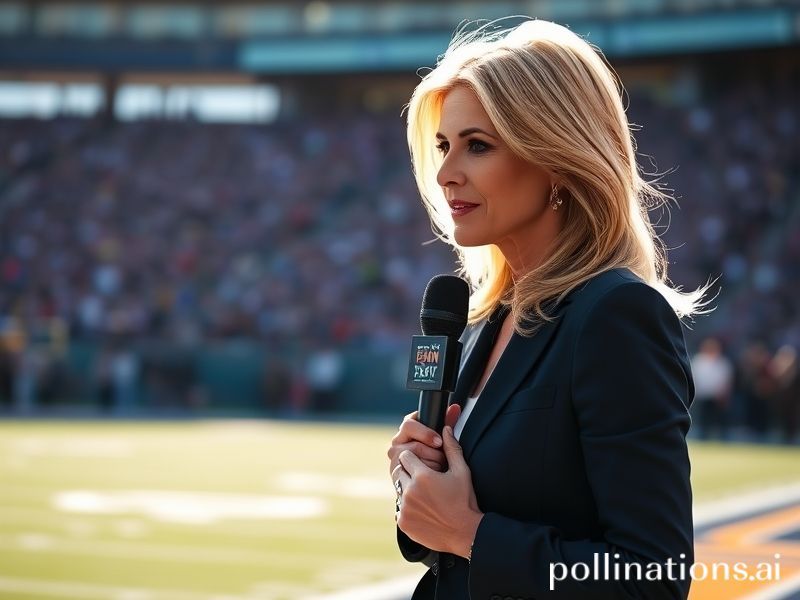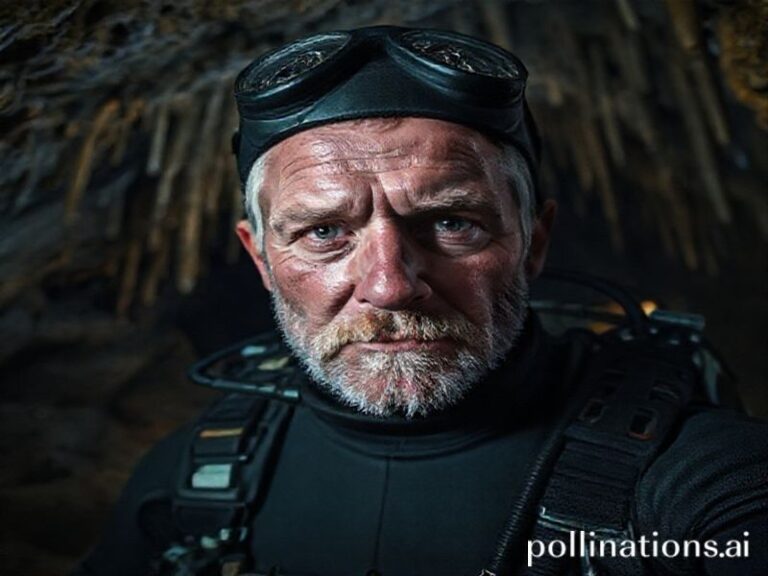Laura Rutledge: The Sideline Diplomat Selling American Chaos to a Distracted Planet
Laura Rutledge: The Sideline Oracle in a World That Forgot the Score
By our man in the cheap seats, somewhere between Atlanta and existential dread
If you’ve ever tried explaining American college football to a Parisian bartender at 3 a.m.—a rite of passage for any self-loathing correspondent—you’ll know the sport’s cosmology bends faster than light in a black hole. Yet somewhere in that quantum foam of mascots, booster cash, and unpaid labor stands Laura Rutledge, ESPN’s unflappable sideline savant, calmly translating the chaos for a planet that still thinks a “first down” is an obscure British tax.
Rutledge’s nightly perch on the College GameDay dais is less a broadcast set than a geopolitical fault line. To the west, billion-dollar conferences rearrange themselves like NATO expansion, luring Texas and Oklahoma to the SEC with the same transactional glee Germany once showed East European satellites. To the east, the Pac-12 dies a slow, whimpering death, its last members sprinting toward the Big Ten like refugees clutching conference-realignment visas. And there, microphone in hand, stands Rutledge—part polyglot diplomat, part grief counselor—asking Nick Saban if he’s “pleased with the second-half adjustments,” which is code for “How does it feel to orchestrate the systematic dismantling of another human dream?”
The international stakes are higher than a Clemson linebacker on creatine. Rights fees ricochet across currencies; Disney’s balance sheet flinches every time the yen dips, and Rupert Murdoch’s Australian ghost hovers over every sublicensing deal like Banquo with better hair. Rutledge, fluent in the body language of 4-star recruits and 5-star generals alike, must now serve two masters: the American couch potato demanding bloodsport in 4K, and the Singaporean day-trader streaming on delay between margin calls. Her questions—crisp, mercifully short—are tiny acts of linguistic triage in a world hemorrhaging attention spans.
Meanwhile, the athletes she interviews are unpaid exports, human supply chains. A five-star cornerback from Lagos may generate more annual revenue for his university than Nigeria’s entire yam harvest, yet he can’t legally accept a free sandwich without risking eligibility. Rutledge’s job is to pretend this is normal, the same way UN envoys once praised “elections” in 1970s client states. The difference is she does it with perfect hair and a smile calibrated to survive both Instagram scrutiny and the Tuscaloosa humidity.
Viewed from afar, Rutledge herself has become a soft-power asset: a blonde, Georgia-born ambassador for the notion that American excess can still be charming. European soccer may boast tactical nuance and actual relegation, but it can’t match the pageantry of a marching band spelling “FREEDOM” while a jet flyover deafens poultry for three counties. Rutledge packages that delirium into bite-sized empathy, the way McDonald’s once sold the idea that hamburgers equal happiness—only now the burgers are concussion protocols and the Happy Meal toy is a NIL collectives explainer.
There’s darker irony, of course. On the same weekend Rutledge gamely interviews a tearful coach about “adversity,” floodwaters swallow villages in Pakistan and Ukrainian drones redecorate Russian oil depots. Yet the global feed still cuts to her, live from a parking lot in Knoxville, because 110,000 people painted orange is apparently the balm civilization needs. Call it escapism or call it propaganda; either way, the ratings beat CNN’s live war coverage three to one, which tells you everything about the species you didn’t want confirmed.
And so the caravan rolls on, from Athens to Auckland (yes, they now watch SEC games in Kiwi bars at dawn, proof that cultural imperialism wears a foam finger). Rutledge remains its photogenic narrator, a one-woman State Department for shoulder pads, dispensing real-time updates on the only empire still expanding: the one where unpaid labor generates billions and everyone pretends the coin toss is sacred.
Conclusion: Somewhere in the multiverse, a parallel Laura Rutledge reports from the sidelines of climate summits, asking ministers if they’re “happy with their second-half carbon adjustments.” In this universe, she sticks to football, bless her. Because if we’re going to ignore the apocalypse, we might as well do it between commercial breaks, with impeccable lighting and a perfectly timed toss to break.







